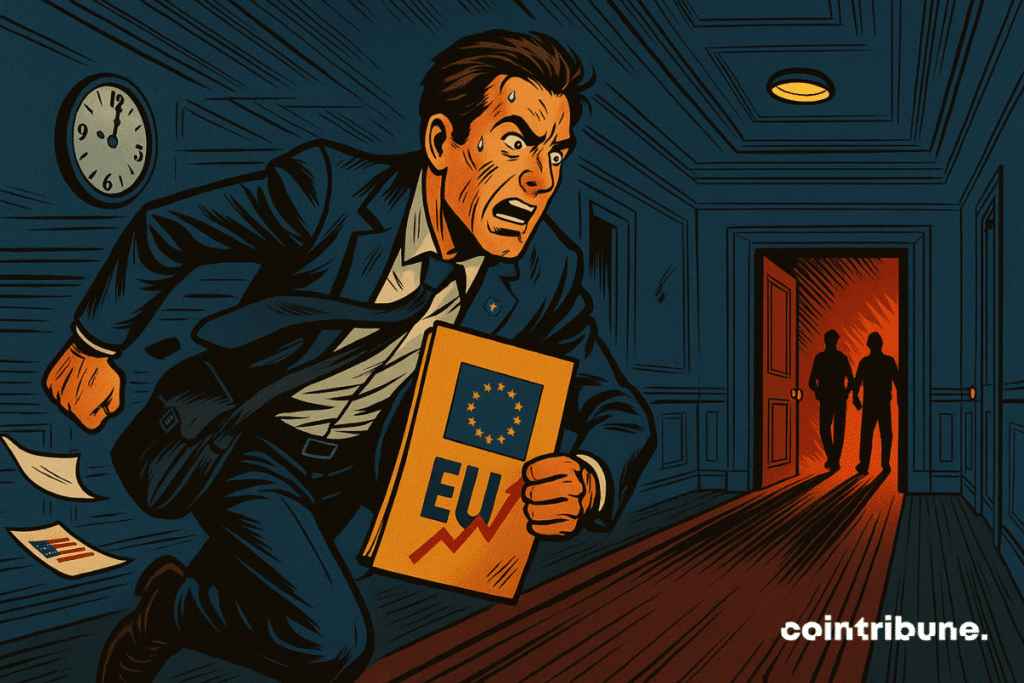Breaking: Europe & US Nearing Crisis-Averting Deal—Will This Weekend Seal the Pact?
Geopolitical tensions thaw as transatlantic negotiations hit overdrive. Sources whisper a landmark agreement could drop within 48 hours—just in time to prevent another market bloodbath.
Behind closed doors: What we know
Insiders report feverish backchannel talks addressing everything from energy sanctions to crypto regulations (because nothing says 'diplomatic breakthrough' like arguing over Bitcoin mining). Both sides desperate to avoid triggering recession dominoes—especially with midterms looming.
The finance angle
Bankers already pricing in the 'compromise premium'—that magical moment when politicians declare victory while quietly surrendering 80% of their demands. Watch for the usual suspects to spin this as 'stability' while quietly shorting the euro.
Bottom line: If this deal collapses, grab your popcorn. If it succeeds? Grab your wallet—Wall Street's discount fire sale might get postponed.

An ultimatum and customs escalation
As the countdown begins before the July 9 deadline set by Donald Trump, negotiations between Washington and its trade partners, including the European Union, are intensifying.
This Saturday, the French Minister of Economy, Éric Lombard, spoke to emphasize the seriousness of the situation. He declared:
I hope we will have an agreement this weekend. Otherwise, Europe will probably have to show more strength in its response to restore balance.
A delegation from the European Commission is currently in Washington aiming to defuse the threat of tariff sanctions. The alert is clear: without a quick agreement, punitive customs measures will apply to European exports to the United States.
These sanctions announced by Donald TRUMP date back to early April, when he proposed a unilateral reform of U.S. foreign trade. At that time, he temporarily suspended the application of these increases to allow for bilateral discussions. However, the American president confirmed last Friday an imminent tightening. Here is what is now on the table:
- Punitive customs duties applicable from August 1st, 2025, in the absence of a trade agreement;
- Customs surtaxes ranging from 10% to 70%, depending on the targeted countries;
- The sending of 12 official letters starting Monday, targeting major trade partners, including the European Union;
- A targeting criterion based on trade imbalances, notably countries exporting more to the United States than they import from it.
The American approach, based on a bilateral logic, breaks with the multilateral regulatory principles defended so far by the WTO. For the European Union, this offensive strategy directly calls into question its ability to protect its industrial and strategic interests against a historic partner that has become unpredictable.
Europe called to defend itself: towards a return of protectionism?
Beyond the attempt at de-escalation, Éric Lombard stated that Europe must prepare to respond firmly. “Europe will probably have to show more strength”, he insisted, emphasizing that restoring a balanced power dynamic is essential.
He thus considers it “essential” for the Union to erect its own customs barriers, both against the United States and against other economic powers like China, which is also accused of distorting the commercial playing field. Far from limiting his remarks to the American case, Lombard sketches a broader vision: that of an economic world governed by raw power dynamics, where multilateral rules no longer apply.
The minister illustrated his point with a striking metaphor, comparing the current situation to “a playground where everyone plays hopscotch with supervisors and respecting the rules. And there are three bullies who arrive and no longer respect any rule.” In this picture, the “bullies” are clearly identified: the United States, China, and Russia.
This image conveys a DEEP concern: that of a global trade disorder where European economies, still attached to the WTO legal framework, risk being marginalized if they do not respond.
On financial markets, the climate of uncertainty is also fueling moves towards alternative assets. Bitcoin, often seen as a SAFE haven against geopolitical tensions and unstable monetary policies, could benefit from a tightening of trade relations.
A transatlantic tariff war would strengthen distrust towards state currencies, increasing the appeal of decentralized cryptocurrencies such as BTC. Institutional investors are closely monitoring the development of negotiations, aware that failure could revive volatility and reposition digital assets at the heart of hedging strategies.
The consequences of this tension could be significant. An increase in customs duties, currently suspended by Trump, would severely penalize European exporters while fueling imported inflation on the Old Continent. In the medium term, this could strengthen Europe’s will to build strategic autonomy, both industrial and monetary. In this uncertain context, markets, including cryptos, will have to integrate new geopolitical and tariff variables. The return of protectionism, if confirmed, could durably reshape trade flows and encourage more sovereign economic policies.
Maximize your Cointribune experience with our "Read to Earn" program! For every article you read, earn points and access exclusive rewards. Sign up now and start earning benefits.

